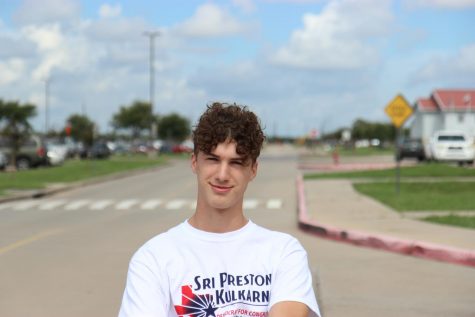Howdy Ibbi Shiekh!
Let’s take a closer look at the world of debate through the eyes of the debate team captain, Ibbi Shiekh!
November 30, 2018
Wrangler: What do you enjoy about debate?
Shiekh: I think that it provided me a really good educational experience, that the classroom can not parallel with; especially because it’s…the only class that you actually critically think in and you get to pursue your own research passions, so I think I definitely appreciate that aspect of it. Also, I made a lot of friends across the country competing on the national circuit, and so it’s really cool learning about different high schools and talking to different people who aren’t just from your high school. I made some really good friends.
Wrangler: Debating, and the culture that comes with it, how has that influenced you as a person?
Shiekh: I think it’s made me a lot smarter…I think that I’m able to think a lot quicker, especially in regards to my peers, it’s not like in math and science classes, but like in general I’m able to think very quickly, because I’ve had to, because all the debates are timed and everything, you have no time, especially in situations I don’t know what to do. So that has been really helpful.
Wrangler: Competing in both debate and soccer, you are someone who has competed in both athletic and academic competitions. What parallels can you draw between the two?
Shiekh: Since I’m nerdy, I think that debate is a sport. If you don’t practice, there is no way you can be good at it. It’s literally impossible. I think the only difference would be that it doesn’t necessarily require a team because I compete individually around the national circuit but even then I have to do research with friends and we share articles and such. So it does have a team aspect, but then similar to having games on weekends or on Fridays, we had games on Tuesdays and Fridays, but we have tournaments every weekend; I think the same similarity is there, that we have to compete every weekend and if we win, we win and if we don’t we just have to get ready for next week similar to a practice if you would. But I think that the constant cycle of practice, compete, practice, compete is the same as any sport that you would compete in, it’s just not athletic.
Wrangler: What is the average debater like?
Shiekh: Good debaters, I think, there is a class of good debaters who compete nationally and are incredibly competitive, and there are some debaters who aren’t so competitive but do it more for fun. And I think I would classify myself not necessarily as a good debater but one who is incredibly competitive especially when I’m going to tournaments, because each tournament is like 300 bucks, so I don’t want to waste money for no reason. So I think it takes a while to make friends on the circuit, because everyone is competing against each other, it’s not a team sport or anything, so I think after a while, everyone is kinda reserved and there is a shadow of judgment, but once you get past that barrier it’s just a regular group of friends, and everyone is kind of mean to each other.”
Wrangler: Can you give us a story that details the harshness of debate culture?
Shiekh: Sophomore year, when I wasn’t very good, and I had to go compete at these tournaments, I would sit by myself, at a lunch table, for 12 hours. Because it’s so hard to make friends, if you aren’t good. So that was sophomore year, I only went to one national tournament; but junior year, until I proved myself good enough, which wasn’t until the second semester, I would sit by myself at tables for 12 hours. Like I went to UT, I went to a library room, by myself, for 12 hours.
Wrangler: How do you mentally prepare for debate and all its harshness?
Shiekh: It requires me to not have anything on my mind, like if I get a bad grade on a test the week before a tournament, I do really bad at that tournament. It requires like complete focus. Most of the time I listen to calming music, but before really big rounds I listen to trap music to get hype, like Young Thug.
Wrangler: How much time do you spend on debate?
Shiekh: Peak season, like 40 hours a week, including tournaments, that’s an hour everyday in class, an hour and a half on Wednesdays, and two to three hours every night on drills and researching.
Wrangler: How exhausting is debate?
Shiekh: It’s so tiring, it’s not physically tiring, obviously, but it’s mentally draining because it’s talking for 45 minutes, 6 rounds and if you do well that’s more elimination rounds. Like the best tournament I went to, the Churchill tournament, I debated ten rounds because I got to the finals, which meant that’s 45 times 10, that’s 450 minutes of straight talking. So, it is emotionally draining, especially if you do bad, I’ll feel horrible afterward, I’ll get depressed for long periods of time and I just get insanely tired after a tournament.
Wrangler: Do you have any inspirational words for young debaters?
Shiekh: It’s the hardest activity I have ever done in high school. I’ve played sports and everything. I think it would be easier for me to try and be valedictorian than be the best debater. It’s insane.




